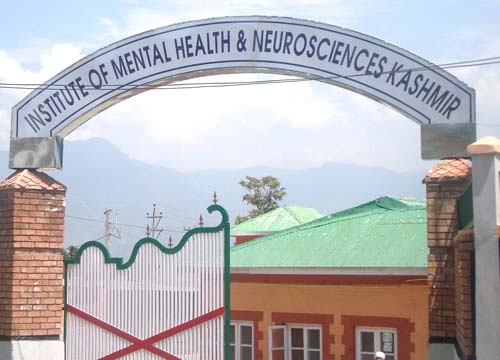When the story of ‘Razor Man’ grabbed headlines some years back, the media was quick to project him as an outlaw on the run. The society made him an outcast while even his family abandoned him. Little do they know that he is suffering from a mental illness and needs proper care for recovery, Heeba Din & Uzma Manzoor report.
Slouched in Bed No 3 of Institute of Mental Health and Neurosciences in Srinagar, Javaid Ahmad speaks with urgency in his voice, ”I have told my family not to visit me until they have bail papers.” In his mid-forties with distant, dull eyes, Javaid was booked for attempting murder in September 2006 when he slashed the neck of a man with a razor in Khanyar’s Dastageer sahib locality. He escaped from the spot.
Javaid has a long history of schizophrenia, a mental disorder that makes it hard to tell the difference between what is real and not real, to think clearly and have normal emotional responses. He was first admitted at the Institute of Mental Health and Neurosciences, Kashmir, in 1996 where he underwent treatment for almost a year. It was in 1998 that he was discharged. For years, he stopped taking medication and was again admitted in 2005 after which the symptoms began to reappear in 2006 when he started committed crimes. He has also been accused of attacking a child in Khanyar locality of old Srinagar city.
Soon after the Khanyar attack made newspaper headlines, Javaid’s case became a talk of the town which earned him the sobriquet of ‘Razor Man’. Society made him an outcast while his family abandoned him. But not many people are aware that Javaid is suffering from mental illness. “Javaid is like any other human being. God has given him this illness. If we take care of him, he can live a productive life,” Dr Arshad Hussain, a renowned psychiatrist of Jammu and Kashmir says.
The latest examination report conducted by the doctors at the hospital on December 22 last year states that Javaid can be sent back to community or jail, whatever the court decides. “He doesn’t need in-patient admission at this point of time. However he needs to take the medication prescribed continuously and may relapse if stopped,” the report says.
Javaid has been receiving medical treatment at the Institute of Mental Health and Neurosciences for the past four years after he was brought by the police to the hospital. The past records show that the ‘razor man’s’ frequency of violent behaviour has decreased considerably due to medication. His behaviour and appearance has been reported ‘appropriate and well mannered’. Under proper care and supervision of the hospital, Javaid has had no hallucinations. As per the doctors, Javaid takes good care of other patients in the Central jail ward.
However, like the nine previous examination reports, the latest one also finds its place in the half-torn pages piled one over another and resting in the dull yellow file cover with Javaid Ahmad Kumar written on the top. No one wants him back.
We went to meet his family at their Kralkhud residence in old Srinagar city. The house is a small, single-storey building situated in a narrow lane. We knocked at the door and an old woman opened a window and asked us who we were. When we told her that we had come to talk about the case of her son, she asked us to come later. We insisted her that we won’t take much time. But she was adamant and advised us to come to the house only when her elder son was present. She won’t talk about her son. It was as if Javaid didn’t exist for her.
The cases of Schizophrenia are very rare. Only one per cent of people in the world suffer from the disease and 70 per cent of them are treatable, according to medical research. Mental health experts are not sure what causes the disease. However, certain events may trigger schizophrenia in people who are at risk because of their genes. One is likely to develop schizophrenia if he/she has a family member with the same disease.
Schizophrenia affects men and women equally. It usually begins in teenage or young adulthood but it may begin later in life too. Schizophrenia symptoms usually develop slowly over months or years. Sometimes you may have many symptoms, and at other times you may only have a few symptoms. People with any type of schizophrenia may have trouble keeping friends and working. They may also have problems with anxiety, depression, and suicidal thoughts or behaviours.
Where 99% of people suffering from mental illness never harm anybody, Javaid’s case is a rarity. Whatever he did, he did out of inner fear. “Imagine one suddenly hears a voice and considers it a reality. It means he is much stressed,” Dr Arshad says.
Patients like Javaid need the support of their family and society to live a normal life. “According to research, 97 per cent of violence is not committed by mentally challenged persons or schizophrenics. People who suffer from mental illness along with drug abuse have chances to commit a crime which wasn’t the case with Javaid. Such people need extra love and care from society. The society generally doesn’t understand such people which attach a social stigma with them,” he says.
While society tends to abandon such patients, the treatment for diseases like Schizophrenia is really expensive. “Financial crisis becomes one of the reasons why families abandon such patients. I can only take care of Javaid as long as he is my patient. I can’t rehabilitate him. Someone has to step in; an NGO, an institution or even his family,” Dr Arshid says.
An endless wait for trial in courts leads to depression in any normal person and the same situation can have a damaging impact on the mind of a mentally ill patient. “It affects their overall treatment and prognosis. As courts cases are a time-consuming process, the need of the hour is to have fast track courts for such patients where they can receive justice,” said one of the doctors at the hospital.
“Patients like Javaid should be taken to rehabilitation homes rather than keeping them in psychiatric hospitals,” Dr Mansoor Ahmad Dar, a resident doctor at the hospital said. The mental law act does not state any provisions for keeping separate wards for patients like Javaid, yet the hospital has provided a separate ward for them. While the hospital is doing their part by taking care of such patients but the social stigma attached to such cases isolates these patients to the point where their diseases can only worsen.
“Rather than blaming the slow judiciary, his family is at fault for not pursuing the case. However, there is not only one reason for the abandoning of such patients. Many things work together which become a hurdle for them; be it a social stigma, financial crisis, the cold response from family or negligence from authorities,” said Dr Arshid.
“This is a gross human rights violation. Had the same case happened outside the state, the convicts would have been acquitted and they would have moved on with their lives. The court authorities have been sending official letters asking about Javaid’s state of mind. In spite of continuously stating Javaid was not fit to stand trial, nothing has happened,” said Dr Mansoor.
With every letter that reaches us, our hope for Javaid’s release has further dwindled, he said.
















well put by uzma n heeba…. perhaps Javid s there because of media hype and a repeat hype only can save him.